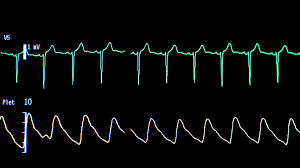Source: healthcareitnews.com
Artificial intelligence technology based on a deep learning model could help cardiologists predict irregular heart rhythms, known as atrial fibrillation, before it develops.
WHY IT MATTERS
That’s the conclusion drawn from two studies to be presented at the American Heart Association Scientific Sessions 2019 and conducted by Geisinger researchers.
A team of scientists trained a neural network to evaluate electrocardiograms to predict which patients were likely to develop an irregular heartbeat, using the AI model to analyze the results of 1.77 million ECGs and other records from almost 400,000 patients.
Researchers trained deep neural networks using ECG results from across 30 years of archived medical records in Pennsylvania and New Jersey’s Geisinger Health System, finding the AI was able to provide longer-term prognostication and more accurately identify at-risk patients.
The model was also able to predict which patients would develop an irregular heartbeat, even when doctors interpreted the test results as normal, by analyzing 15 segments of data comprised of more than 30,000 data points for each ECG.
In what was called the most important finding of this study, the neural network was able to accurately predict risk of death in patients, even when independent cardiologists were unable to recognize those same risk patterns.
THE LARGER TREND
An August report published in Circulation: Arrhythmia and Electrophysiology, a journal of the AHA, indicated doctors in the future may be able to apply AI platforms to EKG data in order to measure overall health status.
Data compiled from the use of AI and neural networks, alongside data gathered from digital devices, is increasingly seen as an important tool to help doctors establish risk factors in patients early on.
Data from accelerometers in wearables has allowed researchers to correctly rank the mortality risk using 30-40 percent more accuracy than when using data about smoking status or a patient’s stroke or cancer history, according to a recent federally funded study by Johns Hopkins Medicine researchers, published in the October issue of The Journal of Gerontology: Medical Sciences.
ON THE RECORD
“This could completely alter the way we interpret ECGs in the future,” said Brandon Fornwalt, who co-directs Geisinger’s Cardiac Imaging Technology Lab and the senior author on both studies, said in a statement.
Researchers hope the model could be used in the future to help identify patients with AFib early on so they can be treated to prevent stroke, however additional studies will be required to determine how to best apply the data to larger populations.
“Being able to understand who is at risk for having irregular heartbeats or atrial fibrillation then helps us understand who may be at risk of also having a stroke and then treating these individuals and preventing both atrial fibrillation and perhaps a stroke down the road,” said Jennifer Hall, chief of the Institute for Precision Cardiovascular Medicine at the American Heart Association, in a statement.
